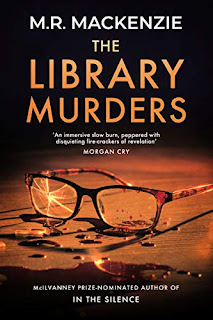The Library Murders – M.R. Mackenzie
So far in his first two novels (and one free download short story The Girl Who Wasn’t) M.R. Mackenzie has covered common gang related violence, the abuse of power by politicians and law enforcement authorities and the crimes enacted by men on women in the form of rape, domestic violence and psychological abuse. In many cases all these crimes are interrelated and Mackenzie covers them well not only from the academic side of criminologist Anna Scavolini (In The Silence) but from the common person in the street perspective of her old friend Zoe Callaghan (Cruel Summer), if she will forgive me for describing her as common (and you won’t want to mess with her, believe me).
What is great about this all encompassing view of crime and how it relates to the public is that Mackenzie doesn’t dress it up with the safe palatable and acceptable format of it being just fictional violence, of people being murdered, beaten and raped just for the sake of convenience of a plot development or the excitement of a crime thriller. It’s not as just a narrative device to elaborate into a crime thriller, but something that in many forms and guises has a very real impact on ordinary people’s lives. It’s about treating crime as something that has consequences for individuals and society, looking at reasons why it might be covered up by the authorities, the law, by those with power, money or just those with something to hide. Which means it can often shocking and unpleasant.
But that doesn’t mean it can’t be without a certain amount of flair and thrills either. Take the stunning shock opening chapter of Mackenzie’s latest standalone thriller The Library Murders for example. The author’s fluid prose and down-to-earth characterisation lulls the reader into an easy familiarity with a common everyday situation before suddenly all hell breaks loose. Alyssa Clark has recently moved from her home in Canada to start a new life in Glasgow, but her first day in her new job as an assistant at Thornhill Public Library doesn’t get off to a great start. It’s not just the hangover from the night before or the awkward introductions to her new colleagues, it’s the fact that she isn’t in the building 15 minutes when a masked gunman walks into the library and shoots everyone behind the desk.
It’s not a great start to the day by any means, but it’s certainly a kicker of an opening chapter. The writing is fluid, precise, the dialogue authentic and witty, capturing a sense of character and personality in the few lines that describes them before they are all cruelly and randomly executed. Did I say all? Randomly? There are some survivors who are certainly not unscathed and evidently the attack was not completely random. ‘The Event’, as it becomes known is more than just an opening salvo, is something so shocking that it has long-term consequences and has an impact that is subsequently felt by the individuals in psychological terms. Evidently they (like the reader) want answers, want to understand how something like this could happen, and – which is where the crime thriller element comes into it – investigate why it happened.
The Library Murders is not an excuse either to bring the hot topic of terrorism or racially motivated crime into the mix, but how else can you explain such a seemingly indiscriminate attack on innocent people? There are reasons of course, but if anything The Library Murders shows rather that not all crimes fit into easily explicable patterns of criminological study (take that Scavolini!). The problem with that however is that the authorities and police don’t like ‘random’ and crimes that don’t fit a pattern, as it makes their life difficult. Some crimes are too complex to unravel motivations and too costly to resolve when there is an easier ‘fit up’ option that will keep the politicians, newspapers, tax payers and budget-holders happy. And the library management are also keen to wrap the whole incident up and put aside any unpleasant associations it might leave on the reputation of the library and the community. Fortunately, Alyssa Clark – and the author – are prepared to dig a little deeper.
There is a lot to take out of The Library Murders then if you want to view it in the context of an overview of Michael Mackenzie’s crime writing so far, if you want to examine it in terms of crime as a social or political issue, but there’s no obligation on the reader to do any of that. The author lets those themes arise with deceptive ease out of what is on the surface still a thrilling, intriguing crime thriller, told with easy-going authentic dialogue, insightful observations on human motivations and behaviours with plenty of twists and revelations to keep you hooked through to an unexpected showdown conclusion. The Library Murders is a clever sidestep from M.R. Mackenzie’s Anna Scavolini crime thrillers that leaves you in anxious anticipation of where the next one might be heading.




Comments
Post a Comment